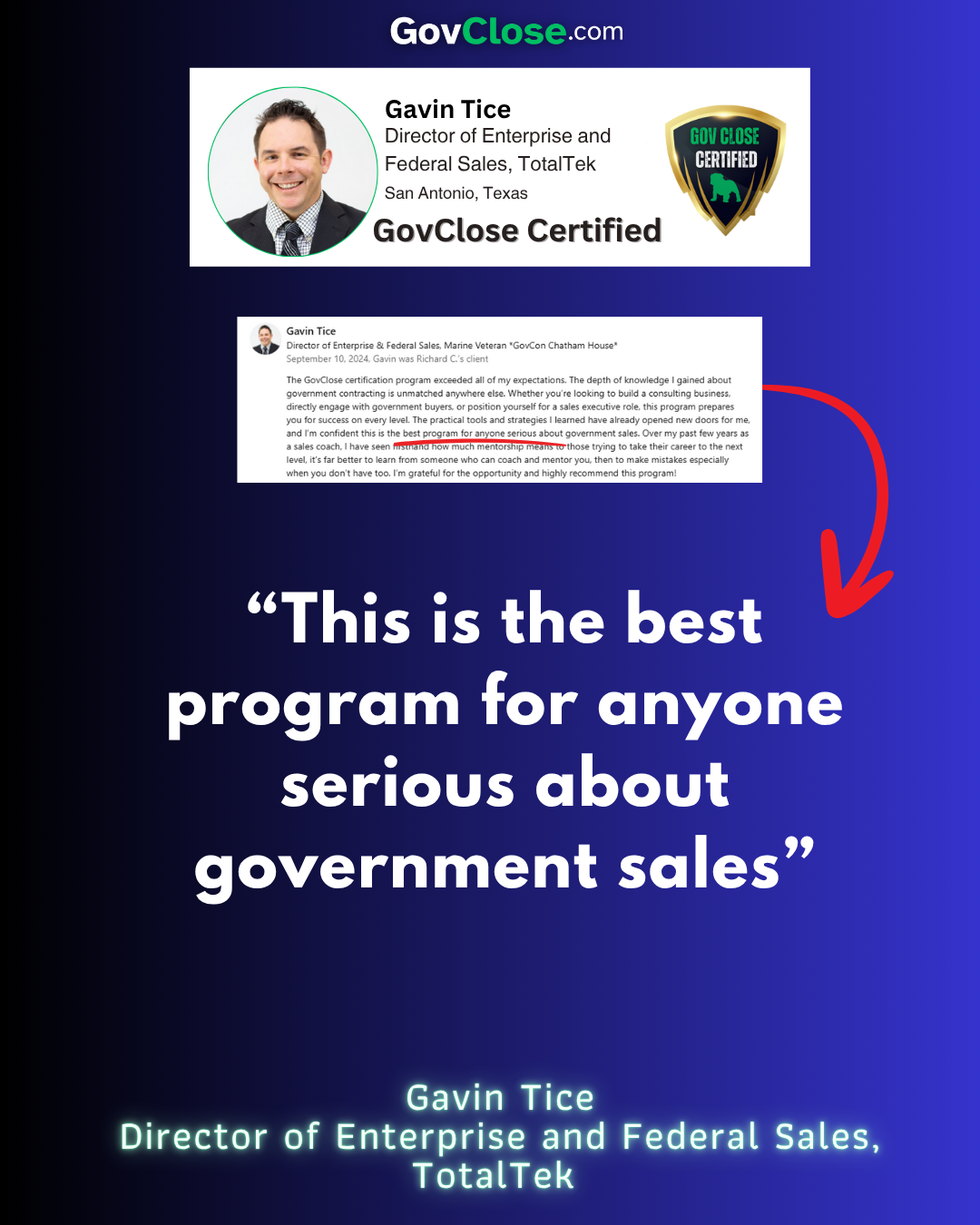
GSA Questions (Podcast Transcript)
Oct 05, 2022[00:00] Richard C. Howard: Hey guys, Ricky here with Government Sales Momentum, and today we're going through some questions that we've been getting and one of them is about GSA. So the GSA contract and we talked a little bit about when it's appropriate to use GSA when you need it. And I'll touch on that for a second, but I want to get into how you're going to use GSA because I think there's some confusion about that with businesses that are either looking at it for the first time or being sold that they need a GSA contract. Or if you have a GSA contract and you're just not winning any business, what is the purpose for GSA? How do you utilize it to your best value?
So first, do you need GSA? You can go back and look at some other podcasts, but the bottom line is you don't need GSA to sell to the government. But every product, every service, every technology is different. And what I mean by that is that the government buys different things in different ways. Office supplies, for instance. If you go and you can, you can go and you can look at how office supplies are being purchased by the government and you'll see that GSA is used in a majority or at least a large percentage of government purchases are going to go through GSA versus you pick some other industries, then GSA may not be that utilize that much. You'll see there's somewhere maybe GSA processes 10% or 20% of transactions or nothing that we can see. It all depends. And the point is, if you find out that GSA is used for 20% of purchases in your industry, do you need a GSA contract? Well, the answer is no, you don't. You might want to get it at some point, but that is not going to be necessary for you to start selling to the government. That means that there are some other ways you can go online and you can look and use free tools like USA Spend or some others that we've gone over that are paid for to find out exactly how the government's making purchases. Some of them are going to be competed, openly competed.
Some things are bought with a GPC card. Some things are going to be simplified acquisitions or sole source contracts. Just depends. And the great thing about the public sector is all the information is public. You can go out there and find out about that. So don't spend your time and money going out and getting a GSA contract if you don't need it. But what if you do need it? What if the majority is going through GSA, or maybe it's 20, 30% and you would like to go get that vehicle? Should you get it? How do you get it? How are you going to use it? Well, first of all, GSA is a great tool for your business, right? Although it may not be necessary to sell to the government, it's going to be a confidence builder. And what I mean by that is that when a company comes into a government office and they have a great solution, whatever it is, product, service, even body armor, whatever you're selling, if the government needs a way to put you on contract. So if you don't have any contract vehicles, and you can see past podcast to learn about contract vehicles, and if you're not on GSA, then it could be difficult for them to put you on contract.
There are ways, simplified acquisitions, depending on the sale, it could be a sole source. But that's really hard. A lot of things have to be competed because the Far remember the Federal Acquisition Regulation is overhanging all of the federal purchases and kind of dictating how we're going to make purchases. So what you want to do with a GSA vehicle or GSA contract, if you have that and you come into an office and you have GSA logo on your capability statement, and when they ask, how do I get to you? You could say GSA. What does that mean? It means you've been vetted. So it's about a six-month process to get a GSA contract. You can do it yourself or you can hire somebody else to help you get it. There's a lot of paperwork involved. They're going to go over things like pricing, right? And those prices are going to be published and you need to know that. But once you have the GSA schedule now, that's the way the government can immediately go to you and make a purchase. They can see what your prices are. They know you've been vetted. So it's a confidence builder. It also helps the government gets you. So there are some great reasons to have a GSA contract. So I don't want to talk you out of it, especially if you need it or it may help you with sales.
A lot of companies, as they start and they start getting some past performance and making sales, a lot of them eventually get the GSA contract and add that to their quiver just to make it easier for the government to purchase from them. So let's say you have the GSA contract and you're trying to figure out how to use it. What are some best practices? Well, one thing that you should know about GSA is a lot of the opportunities that go to GSA contract holders are not going to go to sam.gov. So that's why it's important to know how much goes through GSA, right? So if 70% of purchases are going through GSA, a lot of those are probably not going to sam.gov, meaning they're going to go to the GSA contract holders and they'll compete within GSA for those. So again, GSA is not a, this is not a silver bullet. It's not the government is just going to go to you because you have GSA and buy from you. But it may give you an opening into some new opportunities that you wouldn't have seen before and you could compete for those.
Of course you can use GSA for the government to buy directly from you, but that's going to be a process where you have identified an opportunity. You're sitting down with the program office, they like what you have, then they ask, how do we get to you and it's GSA. And if they can buy directly from you, then maybe they will, right? But for the most part, do not expect the government to start coming to you because you have a GSA contract and saying, hey, we want to put you on contract. What I would expect is you start being informed on opportunities that are related to your NAICS codes, like cyber security or lawn care, whatever it is. I would expect to start seeing some of those populate your inbox and then you make the call, hey, is this something I can compete for? And then you'd put a proposal in and try to win, depending.
There's a lot that's oversimplifying GSA, there's a lot going on in GSA. But that's one of the things you should be aware of, is you're going to see some opportunities that you might not have before that are specific to you and other GSA contract holders. And I think that's a very important part of the GSA process. But it does not mean that contracts are going to magically come to your business. And I've had many clients and other small businesses give me a call for consultations and wondering what they were doing wrong. You're probably not doing anything wrong, but they were maybe sold that, hey, I get a GSA contract, I am going to start bringing in the federal contracts and the purchases. And that's not necessarily the case. I would look at it as, hey, it's great to have, but you still have a lot of work ahead of you using GSA to make those sales, and it's going to be business development influencing opportunities to some of our earlier podcasts. All of that is still in play, only now you can use GSA to your advantage, so hopefully that helps. Hopefully that gives you a little bit about, hey, should I get a GSA contract vehicle? What can I expect when I'm on it and how could I potentially use it on the backside?
All right, well, thanks again for listening. You can go to Dodcontract.com with any questions and I hope to see you next time. Hope you enjoyed this episode of Government Sales Momentum. If you did enjoy the episode, please subscribe to the podcast and leave a review. It's very much appreciated. If you're interested in selling products and services to the Department of Defense, I have something for you that you're not going to find anywhere else in the world. The team and I created a program that takes everything you need to win defense contracts and put it into one place. Up until now, only large defense companies and a small amount of people in the know have had access to how products and services are really sold to the Department of Defense. I've taken all of that information and put it in a step-by-step training module that shows you how to consistently sell to the US. Military. If you join our membership, not only do you get the model, but you get weekly sessions with former DOD acquisitions officers for training and guidance to answer your questions and a community of like minded business owners that want to partner on different opportunities to bid for subcontracting and teaming, or just to discuss general strategy on how to sell to the DOD. You'll have access to every course I've created, every coaching session I've ever recorded, and every interview with an acquisition professional that I've ever conducted. And we cover topics that range from defense sales planning and competitor analysis to SBIR and STTR foreign military sales. The list goes on. Go to Dodcontract.com if you are interested, and I would love to see you in the membership. Thanks.
If you enjoyed this episode, you can also check out Conversations & Opportunities where I talked about how simple conversations can transform into a potential Opportunities on Federal Sales.
Turn Government Contracting Knowledge Into Income
This isn’t a course. It’s a certification and implementation system to help you build a consulting business, land a high-paying sales role, or scale your own company in federal contracting.
We hate SPAM. We will never sell your information, for any reason.


